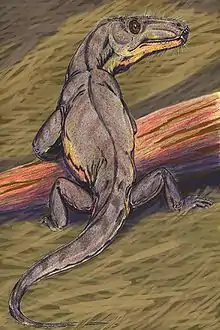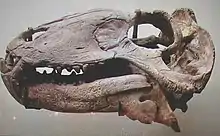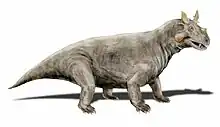Syodon
Syodon is an extinct genus of dinocephalian therapsids that lived approximately 267-260 million years ago during the middle Permian period of the Paleozoic era. These therapsids, located in Russia [1] were initially believed to be true mammals. Syodon was first named by Stephan Kutorga in 1838.[2] The fossils of these synapsids were first discovered in the Molotov Province region of Russia in limestone beds with a high content of copper. However, scientists believe that these organisms likely come from higher rock beds due to increased specializations in their morphology.[3]
| Syodon Temporal range: Middle Permian | |
|---|---|
 | |
| Scientific classification | |
| Domain: | Eukaryota |
| Kingdom: | Animalia |
| Phylum: | Chordata |
| Clade: | Synapsida |
| Clade: | Therapsida |
| Suborder: | †Dinocephalia |
| Family: | †Anteosauridae |
| Genus: | †Syodon Kutorga, 1838 |
| Species: | †S. biarmicum |
| Binomial name | |
| †Syodon biarmicum Kutorga, 1838 | |
Etymology
The name Syodon is derived from Greek meaning pig's tooth. This name likely stemmed from the protruding canines similar to that of the lower canines of a wild boar.
Diet
Syodon is characterized as a carnivore, likely feeding on small-bodied prey. They lack the ‘expansion of supraorbital bones over the orbits, which would act as a stress sink’ in certain hypercarniverous species such as thalattosuchian Dakosaurus. This thickened supraorbital regions also found in large theropods would have alleviated cranial stress used for feeding on large prey.[4] Since this adaption is not found in Syodon it is thought they were limited to small animals and prey which they could easily consume with their limited jaw architecture.
Paleobiology

Syodon is characterized by possessing "bulbous" post-canines featuring significant wear facets in adults, whereas juveniles tend to have ‘bladelike’ post canines. The canine of Syodon is highly distinctive and allows it to be distinguished easily. They also possess a large, strongly curved ‘hook-like canine. Syodon also feature a set of smaller, replacement teeth out-of-place from the main palatine tooth row.[5]
The snout of Syodon is relatively long narrow compared to the rest of the body. The snout comprises approximately 1/4 the length of the skill. These synapsids reached 1.2 m (4 ft) in length.[6]
See also
References
- "Palaeos Vertebrates Therapsida: Anteosauridae".
- Kutorga, S. S. 1838. Beitrag zur Kenntniss der organischen U ̈ berreste des Kupfersandsteins am Westlichen Abhange des Urals. St Petersburg. Gretsch, 38 pp.
- Olson, Everett C. "Catalogue of Localities of Permian and Triassic Terrestrial Vertebrates of the Territories of the USSR." The Journal of Geology 65.2 (1957): 196-226.
- Young, M. T., Brusatte, S. L., Ruta, M. & Andrade, M. B. 2010. The evolution of Metriorhynchoidea (Mesoeu- crocodylia, Thalattosuchia): an integrated approach using geometric morphometrics, analysis of disparity, and biome- chanics. Zoological Journal of the Linnean Society, 158, 801–859.
- Kammerer, Christian F. "Systematics of the Anteosauria (Therapsida: Dinocephalia)." Journal of Systematic Palaeontology 9.2 (2011): 261-304.
- "Syodon biarmicum - Palaeocritti - a guide to prehistoric animals". Palaeocritti. Archived from the original on 18 March 2016.

